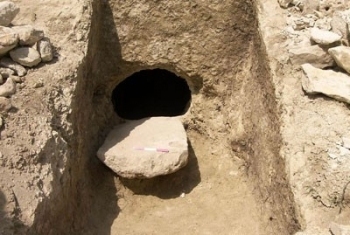Michelle Moran's Blog, page 84
May 11, 2010
Space technology revolutionizes archaeology, understanding of Maya
A flyover of Belize's thick jungles has revolutionized archaeology worldwide and vividly illustrated the complex urban centers developed by one of the most-studied ancient civilizations -- the Maya.
University of Central Florida researchers led a NASA-funded research project in April 2009 that collected the equivalent of 25 years worth of data in four days.
Church and Nilometer discovered on Egypt's Avenue of Sphinxes
Archaeologists working at the Avenue of Sphinxes in Luxor, Egypt, have uncovered the remains of a fifth century Coptic church and a Nilometer, a structure used to measure the level of the Nile during floods.
West Cumbria floods uncover Roman finds prompting major probe
The remains of a Roman fort at Papcastle have been open for several years, but nobody has ever known the shape of local roads, the size of the civilian settlement attached to it, where the river Derwent ran and where it was crossed, or where the site's cemetery was located.
May 10, 2010
Americans helping archaeologists unearth Roman ruins in Germany
WIESBADEN, Germany — American history buffs are teaming up with German archaeologists to unearth remnants of an ancient Roman settlement before construction crews begin work on an Army housing project adjacent to Wiesbaden Army Airfield.
Read the rest here.Buried by a Welsh beach for 60 years, the World War II fighter that has emerged from the seas
May 7, 2010
Crete fortifications debunk myth of peaceful Minoan society
By Owen Jarus
A team of archaeologists have discovered a fortification system at the Minoan town of Gournia, a discovery which rebukes the popular myth that the Minoans were a peaceful society with no need for defensive structures.
Read the rest on The Independent.Archaeological Excavations Department: Roman Tomb Unearthed in Northern Syria

Idleb Antiquities Department has unearthed a Roman-era cemetery dating back to the 3rd century AD in al-Massasia Valley, north of Darkoush town, in the northern Province of Idleb (Northern Syria).
Read the rest here.
Skeletons unearthed by Gloucester Linkages workmen
Two complete skeletons thought to date back to medieval times have been dug up by workmen in Gloucester. The team was working on a £7m project to improve access between the city centre and the new Quays complex when the remains were unearthed on Tuesday.
Read the rest on the BBC.Warmongers pushed 'intellectual' politicians aside
Military warmongers took over the Roman Empire in the third century. The senate, the administrative elite of the Roman empire watched from the sidelines. Dutch researcher Inge Mennen investigated the balance of power in Imperium Romanum during the 'crisis of the third century'. Conclusion: senators lost their military power but retained their status. Meanwhile military emperors pulled the strings.
5,000-Year-Old Skeletons Found in Moroccan Cave
It is the first time that human skeletons dating from the end of the Neolithic period to the Bronze Age have been discovered in Morocco, said archaeologists.
Read the rest here.


